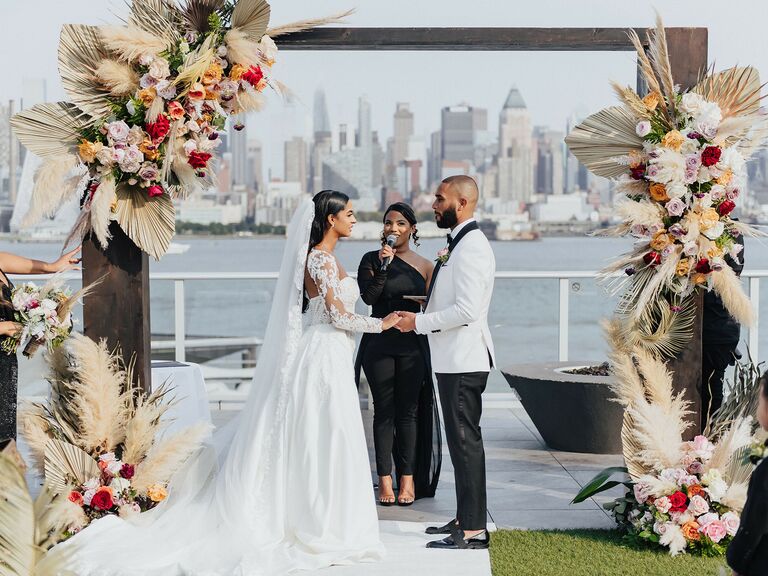Where Should I Get Married? Consider This Before Making the Big Decision
If you're ready to start wedding planning, you're probably wondering: "Where should I get married?" This doesn't mean choosing your wedding venue (that comes a bit later), but your wedding location—the general region, city or state where you'll say "I do." Deciding where to get married helps you choose a venue, date and wedding style. Plus, it allows you to start your wedding pro search, which you can do based on any US location on The Knot Vendor Marketplace. So should you get married in your hometown or where you currently live? What about a favorite travel destination or place you've always wanted to visit? We're here to give you all the facts so you can pick your location with ease.
In this article:
Different Wedding Locations
There are several areas soon-to-weds can consider for their wedding location. The four destinations below are the most common options.
Hometown
According to old-school tradition, a wedding should happen in the bride's hometown. While this may seem like a dated rule, some couples prefer to get married in either partner's hometown, whether they currently live there or not, because it feels familiar and adds a sense of nostalgia to the big day. According to The Knot 2023 Real Wedding Study, 24% of couples married in or near either partner's hometown. And if both partners share a hometown, it may feel natural to host the wedding there. Also, if you want to host a larger wedding and many of your family members and friends still live in the area, you're more likely to yield more "yes" RSVPs with a hometown wedding—and folks won't have to worry about booking travel and accommodations, which is a major bonus.
Current City of Residence
If you and your partner no longer live in your hometown but have chosen a new city where you reside, you might want to consider marrying in your current place of residence. Our study found that 58% of couples married where they currently live. Not only is this more convenient for your crew of friends who live nearby, but marrying in your current location will also make your wedding planning experience a breeze. You can easily meet with your wedding planner on your lunch break or tour an event venue before work. This option can even make your wedding more affordable since you won't have to fly/drive to meet vendors or see the venue. Though certain loved ones may have to travel to your wedding, it's a nice way to show off your "new hometown" to your family members and friends. And you can get ready for the big day at home.
Domestic Destination
Do you and your partner have a favorite vacation spot that's a relatively short drive from your home? Many couples are opting for what we're calling "domestination weddings", which are events located within the US or near a couple's current residence. Going this route can be the best of both worlds—your wedding will feel like it's in a new location, but it's convenient enough that most guests won't have to take long-haul flights. This also makes planning easier since you can probably make easy trips to your wedding location to meet wedding vendors, handle last-minute details and more
International Destination
If distance isn't an issue, then you might consider a destination wedding abroad. Our internal data revealed that the majority of the destination wedding couples of 2023, 35%, flew to Mexico/Baja. Of course, choosing a far-off location for your destination wedding has its advantages (you chose this location for a reason, whether it's the weather, the scenery or the cuisine), but it's important to note that wedding planning from a distance will be a bit more challenging, and some guests may not be able to make the trip.
Factors to Consider
When Choosing a Wedding LocationNow that the "Where can you get married" question is answered, you can start figuring out the granular aspects. Here are the top eight details you need to address before finalizing your decision.
Cost
While the average wedding cost was $35,000 in 2023, it can vary greatly depending on your wedding location. Weddings in major cities usually cost more than those in more rural areas. For example, weddings in New York cost $49,000 on average, while those in Idaho cost about $20,000. So before you choose your wedding location, research nuptial costs in that area. Those on a strict budget must choose the right location since it can make or break your wedding spend.
Travel
When you're trying to find a wedding venue you'll love, you need to ask yourself a few questions. Do you feel comfortable traveling a long distance to your wedding? Are you okay if certain wedding guests can't attend your wedding day because of the distance? Will guests balk at paying for flights and accommodations? If you and your partner feel positive about your answers to the above questions, then you probably found the perfect location. Just remember that destination weddings require more planning, but they can be totally worth it.
Personal Significance
Is there a particular location that has special meaning to you and your partner? Our study showed that 53% of couples who hosted a destination wedding chose the location because it had a special meaning. Whether that's a favorite vacation spot, the city where you attended college or the place where you first said "I love you," hosting your wedding in a place with personal significance can make your big day feel magical.
Venue Choice
Consider your dream wedding venue. Are you set on hosting your big day at a winery, beach or farm but live in the middle of the city? Certain event venue types are more plentiful in certain parts of the country, so be sure your chosen event space is available in your wedding location. Now is the perfect time to use The Knot Vendor Marketplace to start your location-specific search.
Wedding Size
Our study found that the average wedding size in 2023 was 115 guests. However, that number goes down for a domestic destination wedding at 77 and even more for an international destination wedding at 69. If you want a larger wedding, a hometown wedding might be your best bet––an average of 122 guests attended those.
Climate
If an outdoor wedding is a must, you'll need to choose your location carefully. Certain areas are more prone to bad weather at certain times of the year, so it's important to research the weather patterns and climate of the areas you're considering. And remember that no matter where you wed, good weather isn't guaranteed, so make sure your venue has an indoor or covered Plan B just in case.
Scenery
From breathtaking mountain views to a sunset over the ocean, the right backdrop can turn a wedding location from nice to jaw-dropping. If the wedding scenery is as crucial as who's on your guest list, make sure that's a priority when choosing your location. Virtual and in-person visits are a must for this detail.
Peak and Off-Peak Seasons
If you're still wondering, "Where can you have a wedding," there's one more factor to account for––the season. This time, we aren't talking about the weather but instead about the location's popularity during specific times of the year. "Wedding season" is when the majority of weddings occur. Peak times for wedding season vary but usually land between early summer and mid-fall.
Some couples have a specific time of year in mind for their wedding. If you're already targeting a certain season or date, you'll need to research whether that wedding location is in its peak or off-peak travel season. (Psst. The off-peak season would make your wedding venue more affordable.) Hosting a wedding during peak season might mean better weather but also pricey flights, booked hotels and more traffic. Don't forget to check if any special events or other major happenings are occurring in your chosen wedding location—for example, the Kentucky Derby held on the first Saturday in May. Steer clear of hosting your big day during these fun but super-crowded weekends.
What to Do After Choosing Your Marrying Location
Once you've addressed the "Where should I have my wedding" question, you can start planning the rest of your affair. Hop onto The Knot Vendor Marketplace to book your venue, photographer, caterer, wedding planner, live band and more. The best part is you can filter your search by wedding location so planning feels like a breeze. We also recommend using our comprehensive planning checklist to help you every step of the journey.
Chapelle Johnson contributed to the reporting of this piece.
























